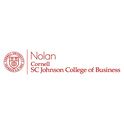Cornell Entrepreneurs Focus on Successful Hospitality Startups
Strange as it may sound, the end game is one of the first things to think about when someone starts a business. As discussed in this year's inaugural Hospitality Entrepreneurship Roundtable, one of the best moves that entrepreneurs can make when they start out is to be sure that their concept and processes can scale for growth. This opens doors to enhanced valuation and the opportunity to work as a franchise. The roundtable was hosted by the Leland C. and Mary M. Pillsbury Institute for Hospitality Entrepreneurship at the Cornell University School of Hotel Administration (SHA).
Roundtable participants dealt with five critical issues for entrepreneurs: funding, franchising, legal concerns, opportunity recognition, and technology (notably, 3D printers and robots). Key issues from these discussions are presented in a report from the Center for Hospitality Research (CHR): "From Concept to Impact: Beginning with the End in Mind; Highlights from the 2015 Hospitality Entrepreneurship Roundtable," by Mona Anita K. Olsen, Kelly McDarby, and Joanne Jihwan Park. The report is available from the CHR at no charge. Olsen is a visiting assistant professor at the SHA and assistant director of The Pillsbury Institute. McDarby and Park are SHA students.
"Entrepreneurs need to plan ahead in several areas, including legal agreements, funding vehicles, and operational strategies, because business ecosystems continue to evolve," said Olsen, who chaired the roundtable. "For example, franchisees increasingly are multi-unit food-service operators, rather than proprietors of a single franchise unit. For this reason, an entrepreneur needs to structure the new business so that it will be attractive to those operators. Technology represents another disruptive force; it is clear that robots can now begin to enhance customer service and value by improving efficiency yet allowing the opportunity for staff to focus on the guest experience. Additionally, we hope to see mass customization with 3D printers."
Franchising. Joe Tagliente, president at Lenrock Management Group, and Benjamin Lawrence, assistant professor of food and beverage management at SHA, facilitated the session that investigated growth and expansion opportunities through a franchising model. A key concept here was "thinking like a franchisee."
Funding. Susan Fleming, senior lecturer of management and organizational behavior at SHA, led a session focusing on the comparative benefits of using Small Business Administration (SBA) loans, finding financial support in personal networks, and crowdfunding. While SBA loans have complicated requirements, participants said they can be helpful.
Concept recognition. Neil Tarallo, senior lecturer of management and organizational behavior at SHA, examined ways to recognize opportunity in the market. This session highlighted the increasing success of restaurants with an attractive concept and strong brand perception.
Technology. Jeffrey Lipton, a doctoral student at Cornell Creative Machines Lab and Chief Technology Officer at Seraph Robotics, led the session that gave an overview of 3D printing and robotics. At the moment, 3D printers may be too expensive for the restaurant industry, but robots are within reach for some purposes, including preparing and plating food.
Legal issues. Adam Klausner, senior lecturer of law at SHA, and Kubs Lalchandani, co-founder and partner at Lalchandani Simon, led the discussion of legal obligations and concerns for business owners, including ownership of intellectual property and making sure the business has appropriate legal support.
The roundtable was distinguished by the formal addition of a student perspective, as several SHA students were at the table as co-presenters. In addition to Lipton, the students were: Ted Kelso MMH '15, Maggie Lo MMH '15, Cassandra Glowaczewski '15, and report co-author Kelly McDarby '16.
Founded in 2006 with a generous gift from Leland Pillsbury '69 and his wife, Mary Pillsbury, the Pillsbury Institute provides support for seasoned faculty and proven entrepreneurs to help students envision their dreams, engage with others, and execute with excellence. The institute guides students in the study of entrepreneurship and innovation, connects them with successful hospitality entrepreneurs and innovators, and gives them practical experience to help them link classroom theory to real-world practice. The Pillsbury Institute is also a source of information about forming new hospitality businesses, managing small and family-run businesses, franchising, corporate venturing, new venture funding, and innovation.
Kristen Ciferri
607.255.0179
Cornell
